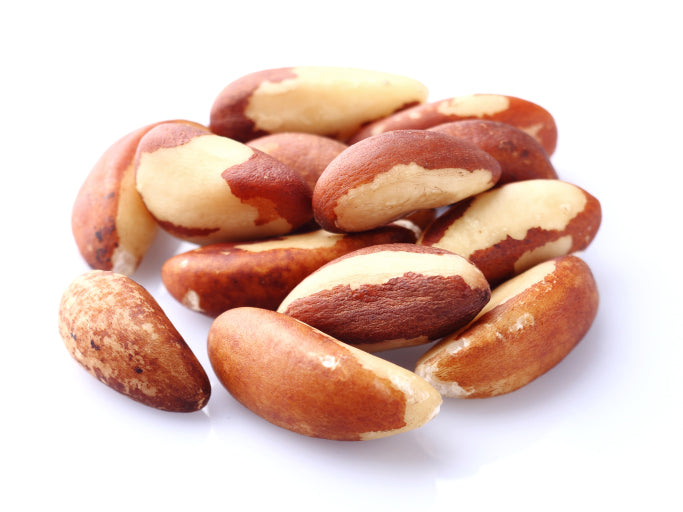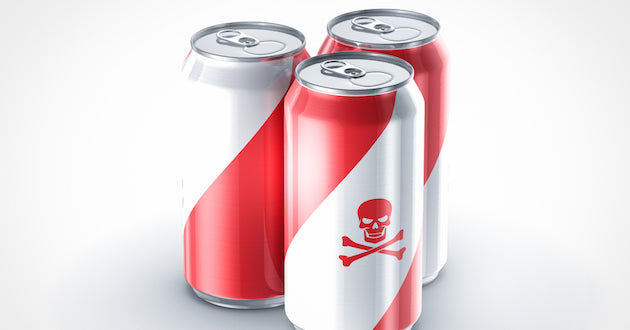It’s a well-known fact that habits like drinking lots of clean water and liberally loading up on raw, vitamin-filled veggies are non-negotiable building blocks to excellent health. This is why we actively aim for lots of Vitamin A and C, for example, in our daily diet. However, there are certain nutrients that work more “discreetly”--in other words, even though we only need them in relatively low amounts, they considerably influence the entire well-being of your body.
Selenium is one of these nutrients.
Although your body only requires selenium in small quantities, it plays a huge role in supporting your body’s immune system and metabolism. Without enough of it in your diet, normal functioning of your thyroid gland is at risk. A lack of selenium also may lead to general fatigue, hair loss, skin discoloration and reproductive issues.
Selenium’s role in metabolism is vital: Selenium acts as a cofactor (helper molecules) for the antioxidant enzymes called glutathione peroxidases, which are
key in the body’s detoxification system and provide protection against oxidative stress. Oxidative stress is what wreaks havoc on your living cells, causing many illnesses and diseases.
Here are some facts about selenium, according to the
National Health Institutes’ Office of Dietary Supplements. How many of these did you already know?
- Skeletal muscle is the major site of selenium storage, accounting for 28-46% of the total amount stored.
- Selenium is most highly concentrated in the thyroid gland than in any other organ in the body, followed by the liver and kidneys.
- Selenium concentration in plant foods varies by geographic location (with dependence on amount in the soil, soil pH, amount of organic matter in the soil and whether the selenium is in a form that the plant is able to utilize).
Why is selenium vital to your health?
Selenium strengthens your immune system’s response to viruses and bacteria. It also, along with other minerals, builds up white blood cells to boost the body’s ability to fight off illnesses and infections. Selenium provides two key bodily protective functions:
-
Antioxidant Power. Selenium contains potent antioxidant properties, protecting cells from damage caused by free radicals. Selenium is the cofactor for some of the antioxidant enzymes called glutathione peroxidase (the “master antioxidant”), which protect cells against oxidative stress. There are eight known glutathione peroxidase enzymes, and five of them require selenium.
-
Thyroid Function. Selenium is essential for a properly working thyroid gland, which secretes hormones throughout the body to influence metabolism, growth, development, and body temperature. Selenium helps carry out the tasks of thyroid hormone synthesis and metabolism, and it protects the thyroid gland from excessive iodine exposure (too much or too little iodine can lead to hyperthyroidism).
Five signs you might have a selenium deficiency
-
Hair loss. Hair loss that comes on abruptly and is evenly distributed could be a result of a lack of selenium.
-
Skin discoloration. Skin discoloration, particularly around your fingernails--which may be unusually white near the nail beds--are signs of low selenium concentrations.
-
Thyroid Issues. Chronic cases of selenium deficiency can lead to hypothyroidism, a disorder consisting of an underactive thyroid gland that can often lead to fatigue, depression and weight gain.
-
Fatigue. While it’s true that other vitamin and mineral deficiencies (such as vitamin B12 and iron) can cause fatigue, low selenium levels might also be the culprit.
-
Reproductive issues. Some studies suggest a link between recurrent miscarriages and low selenium levels. A lack of selenium could also cause changes to menstruation.
What can happen if you’re deficient in selenium?
A deficiency in selenium produces biochemical changes that, when combined with additional stresses, could predispose you to develop certain illnesses. Much research has been conducted to test selenium deficiency against the onslaught of illnesses such as:
-
Thyroid disease: Research shows that taking 200 micrograms of selenium daily might decrease antibodies in the body that contribute to Hashimoto’s thyroiditis, an autoimmune thyroid disease. Selenium might also improve mood in people with this condition. Another study found a significant inverse association between selenium concentrations and thyroid volume in women with a mild iodine deficiency.
-
Cancer: A study done in Germany suggests an association between low selenium levels and a higher risk of colorectal, lung, prostate, bladder, skin, esophageal and gastric cancers, but more research is being done to understand what, if any, other factors are contributing to this relationship.
-
Heart disease: Research is mixed for the connection between selenium and the risk of cardiovascular disease. A meta-analysis has found that low levels of selenium levels do not correlate with a higher risk of hypertension or coronary heart diseases, while others found that lower selenium concentrations were associated with a higher risk or were inconclusive.
What happens if you take too much selenium?
Like with any nutrient, taking too much selenium can be toxic for your health. For an adult, taking in over 400 mcg of selenium per day can be considered an overdose. Do note, however, that it’s very difficult to reach over 400 mcg of selenium intake by diet alone.
Some side effects of an overdose of selenium are:
- Bad breath, fever, nausea, and liver, kidney and heart problems.
- Bad interactions with other medicines and supplements such as antacids, chemotherapy drugs, corticosteroids, cholesterol-lowering drugs and birth control pills.
- Skin cancer. Supplements are associated with a possible risk of the skin cancer squamous cell carcinoma.
-
Possible higher risk of type 2 diabetes.
How much selenium should you take?
According to the National Institutes of Health, most adults should get a minimum of 55 micrograms of selenium per day, with the safe upper limit of 400 micrograms per day. An adult in the U.S. eats about 106 mcg of selenium each day--but keep in mind this statistic includes all adults including those who consume meat, which are the highest sources of selenium.
For raw, plant-based vegan eaters, the selenium intake is likely lower. On top of that, someone who experiences any of the below might be taking in less selenium:
- Smokes cigarettes
- Drinks alcohol
- Take birth control pills
- Are undergoing kidney dialysis
- Have HIV
- Have a condition, such as Crohn’s disease or ulcerative colitis, that prevents your body from absorbing enough selenium
- Live in a region where selenium has lower concentrations in soil, such as the Pacific Northwest or Eastern Coastal Plain (Note: these populations average between 60 and 90 micrograms of selenium per day, which is still above the RDA)
The
chart below lists daily recommendations based on you and your family’s life stage:
| Life Stage |
Recommended Amount |
| Birth to 6 months |
15 mcg |
| Infants 7–12 months |
20 mcg |
| Children 1–3 years |
20 mcg |
| Children 4–8 years |
30 mcg |
| Children 9–13 years |
40 mcg |
| Teens 14–18 years |
55 mcg |
| Adults 19–50 years |
55 mcg |
| Adults 51–70 years |
55 mcg |
| Adults 71 years and older |
55 mcg |
| Pregnant teens and women |
60 mcg |
| Breastfeeding teensand women |
70 mcg |
Getting selenium from food… and its potential issues
The best way to get the most active nutrients into your body is by eating raw plant-based foods, but sometimes, nutrients aren’t readily as available as you might think. Below are some possible reasons why your selenium intake might be obstructed:
- Selenium is naturally found in water and soil, so drinking plenty of water and eating a healthy diet of plant foods grown in selenium-rich soil should be sufficient. However, it’s hard to tell if your food was grown in soil conducive to the thriving of selenium in the resulting plant. Plus, our drinking water is easily and prevalently infected with outside chemicals, negating any benefits of selenium and other essential minerals.
- The highest sources of selenium come from animal products like tuna, shrimp and salmon, but animal proteins have harmful effects on your health by negatively impacting everything, from your weight to your ability to stave off cancer. On top of that, seafood sources especially are additionally contaminated with toxins from their environment.
- The best vegan sources of selenium include nuts (especially Brazil nuts), but some people are simply allergic. You can also rely on whole grains like brown rice. However, the mineral gets destroyed through food processing—not just by cooking it, but through the various farming and transportation processes in place to get your plants to your local grocery store.
You might not be getting enough selenium for these reasons. If you’re experiencing any of the symptoms of a selenium deficiency, consult a medical professional. You then might want to consider taking a supplement.

If you decide to complement your diet with a supplement, why is our Selenium/Glutathione Booster your best bet?
Selenium + the “Master Antioxidant” = Great alone, better together
Selenium/Glutathione Booster was thoughtfully formulated to not only help you maintain healthy levels of the essential mineral, but also to boost your immune system defenses. We achieved this by
uniting selenium and powerful antioxidants that work harmoniously with one another in order to stimulate the increased production of the “master antioxidant” glutathione.
Glutathione is referred to as the master antioxidant of the cell because it’s present in large quantities and able to regenerate
other antioxidants.
While selenium strengthens your immune system’s response to viruses and bacteria, glutathione counteracts the damage to your cells during infections. As your body is given more selenium, more glutathione is produced. On top of that, glutathione is also a key molecule for detoxification in the liver and plays a role countering inflammation in the body.
Additional antioxidants for extra support
Our selenium supplement also contains alpha-lipoic acid (ALA) and N-acetyl cysteine. As a sulfur-containing antioxidant,
ALA works hand-in-hand with N-acetyl cysteine to replenish your body’s ability to destroy free radicals, as well as support glutathione production. Vitamins C and E also play a hand with their powerful antioxidant powers.
In just one capsule, The Hallelujah Diet’s Selenium/Glutathione Booster offers 200 micrograms of selenium in addition to a combination of synergistic antioxidants. If you’re consuming a mostly raw, plant-based diet or are suffering from an illness that causes a deficiency, a supplement will help you increase your selenium levels—without going over the safe 400 mcg limit--so you can boost your immune system and fight off illness and infections.
In Conclusion
Although the body only requires trace amounts of selenium for proper functioning, its importance in stabilizing metabolic processes and supporting your immune system is vital. The antioxidant component of selenium cannot be replaced by other nutrients because of its essential co-function with “master antioxidant” glutathione. You can be sure you’re taking just enough—not too much, not too little—with The Hallelujah Diet’s Selenium/Glutathione Booster.










